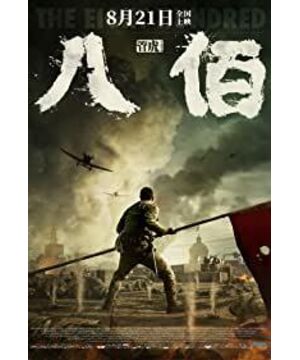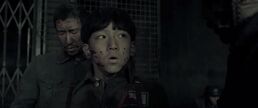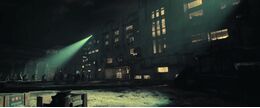The first word I can think of to comment on this movie is "twist", because Yaobai was released in this era, it always seemed so out of place.
1. No Gua
The twelfth hexagram of the "Book of Changes", the Fu Gua, says that the heaven and the earth do not communicate, "No", the gentleman uses thrift and virtue to overcome difficulties, and cannot be honored and rewarded. This is an era of "no gangsters, unfavorable gentlemen", this is an overly blunt subject matter that goes straight to the truth and lies. In my memory, there are very few mainland films that really tried to bring us thinking through this war. Only two films came to mind, "The Devil is Coming" and "Nanjing Nanjing".
Even 20 years ago, when the policy was relatively loose, it still could not escape the fate of being banned. The latter was scolded by the little pinks when it was released, because they all told the truth, the former pointed out the inferiority of the Chinese people, and the latter put forward a fact that contradicted the decades of publicity and education Chinese people have received. - Japanese people are also human. "
And this film touches on the above two points at the same time, the inferiority and the lies of propaganda and education.
In fact, in this story, as long as all the Kuomintang soldiers are replaced by the Eighth Route Army, the Japanese troops are replaced by the U.S. military, the chief officer is replaced by Trump, the Shanghai dialect of reporter Fang is replaced by Cantonese, the Ouhao small rifle can shoot one shot of the latest U.S. fighter jet, and the Avengers also Unable to stop Xiaobing Zhang Ga hiding thunder in his crotch, the five-star red flag fluttered at the end, the people saluted together, the audience absolutely climaxed, and the box office absolutely took off.
Now, this story shows that your stepfather killed your father and told you that your surname was Wang, but that your father was not dead. After 20 years, he came to tell you that your surname was Li. "When a war begins, the first thing that goes out of stock is the telescope." "Aren't all the Eighth Roads fighting against Japan? Why is the Eighth Road only appearing in the opening and closing subtitles?" "Is it so hard to fight, Li Yunlong didn't blow up in the first episode? the Japanese headquarters?" Alas, how can the general audience accept it. Mark Twain once said, "It is much harder to convince people that they have been deceived than to deceive them.
2. The right time and place and "Bian Que Meets Duke Huan of Cai"
Let's compare "Eight Hundred" with the very similar "Nanjing Nanjing" and "October Siege". The former won the day, and it will not pass the trial today.
"Nanjing Nanjing" and "Eight Hundred" together are too similar to our previous text "Bian Que Meets Cai Huan Gong". "Nanjing Nanjing" is like Bian Que meeting Cai Huan for the first time. Although "no one is sick", the situation is not too bad.
And "Eight Hundred" is like the last time Bian Que saw Duke Huan of Cai. People Bian Que knew about Marquis Wang Huan and left, and Guan Hu tried his best to tell Duke Huan of Cai that "you are sick". Bian Que Sees Duke Huan Cai", along with Mr. Lu Xun, were removed from the textbook. Don't you know what Duke Huan Cai is like? You are still beeping in front of people's eyes. Can this matter be avoided?
And "October Siege" won in a favorable location. If it wasn't made in Hong Kong, it would be impossible to have such a story with a high degree of completion. Someone is the father of the nation in many places, but in one place, it can only be Zhongshan.
3. A Metaphor
(The following paragraph is pure nonsense, please do not take the right seat)
In fact, Yaobai is a metaphor for the current Chinese film creation ecology.
Across a river, here are the intellectual academics who make serious movies and hold pens as guns, and there are the wild road and shit that are despised, as well as the audience watching the lively from beginning to end, and the Japanese army. . . . We all know that there is no representative behind the broadcast and TV cut.
Guan Hu is Xie Jinyuan, the twist of "Yao Bai" is Guan Hu's twist, guarding the intellectuals who use a pen as a gun, they can only tell the truth in this way, and they want to die. No, forcing you to live to be seen as a joke. In the country of lies, any truth is so harsh.
Huang Xiaoming's role is Yimou Guoshi, a once-blooded, now successful and old-fashioned film industry tycoon, telling you that "war is politics", this sentence is equivalent to "movies are mouthpieces", who you serve, don't say And metaphor.
Zheng Kai and other "Kamikaze Special Attack Teams", such as Jiang Wen, Lou Ye, Tian Zhuangzhuang, Jia Zhangke, are on the front line of banned films, and they will not hesitate to blow themselves up.
Zhang Yi is probably Zhang Yibai and Xu Zheng, who came from academies but embraced commercial shit and pissed themselves off from serious movies. Zhang Yi's final line to Ou Hao for mercy cannot be more obvious: You Jiang Wen, Lou Ye, Tian Zhuangzhuang, and Jia Zhangke want to give up Shengren to tell the truth and make a banned film. I admire it, but I can't do it.
And the opera troupe on the other side of the river may be the wild road and shit and pee farts like Happy Twist and Guo Jingming. Xie Jinyuan thinks that these people are unpopular actors, and they are not those who make serious movies. At this time, Huang Xiaoming jumped out again, saying that this battle is a show, it is a show, everyone is no different, the film industry is just a An insignificant chess piece, it is enough to have one or two War Wolf and My Country a year, you don't need it, and you can't wake the audience.
View more about The Eight Hundred reviews











